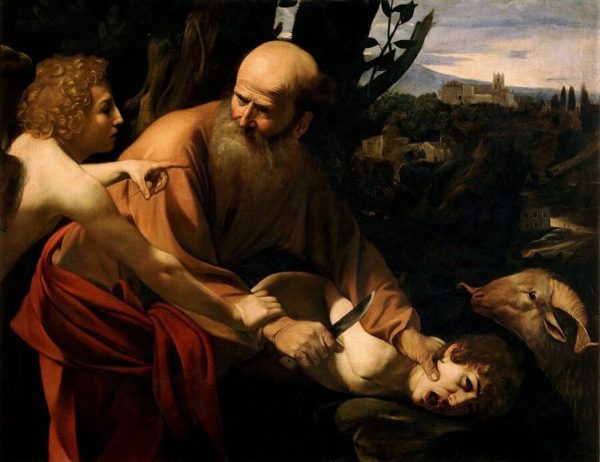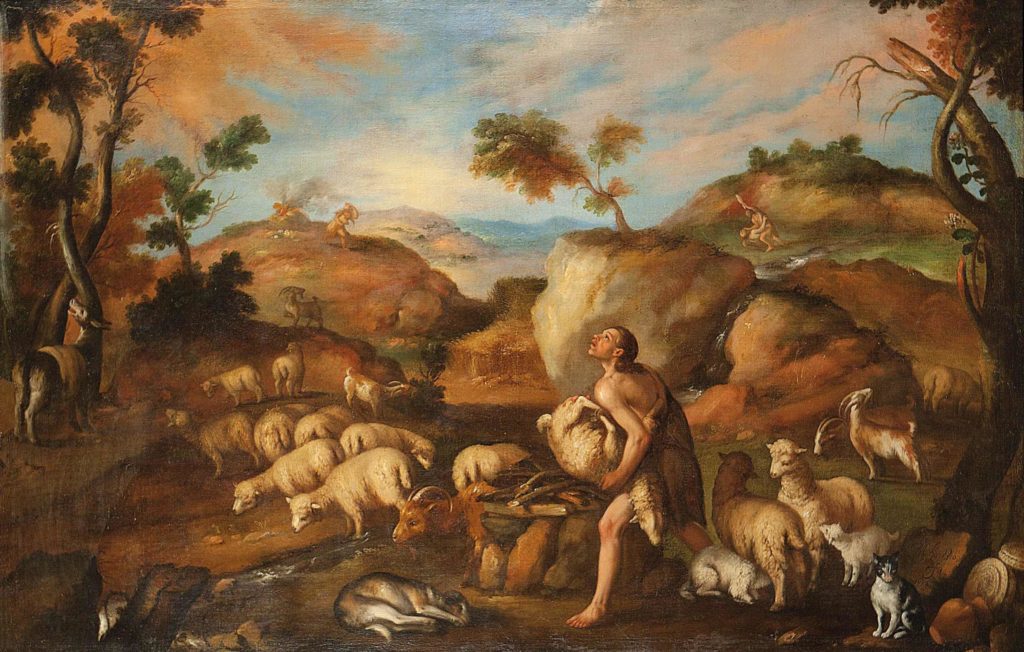
The transition to the pastoral community imposed the practice of animal sacrifice, and before going into the story of this form of sacrifice, I should point out that the children of Israel, according to Dr. Anīs Freiḥa in his book Studies in History, often saw their kings as responsible for the droughts, calamities and afflictions that befell them.
ACCORDINGLY, THEIR SACRIFICES at one time included the sacrifice of their kings, similar to what was adopted by primitive peoples who deliberately killed their kings or elders as the father of them all, upon whom all sins and burdens must be placed so that their livelihood could be guaranteed, their yields increased and their fields fertilized. But with the passage of time they substituted the king or elder by electing a sacrificial victim, and later cast lots among criminals sentenced to death to make the sacrificial offering. All of this finally came to be replaced with an animal – preferably a sheep.
Why a sheep, and what is the story behind its appearance in all the Abrahamic laws, especially Jewish and Islamic law?
Sacrifice in Jewish Biblical Discourse
Before taking a look at the presence of sacrifice in the monotheistic religions and their development and various practices, I would like to draw attention to how it came to be that animal offerings were preferred over plant offerings, and how this indicates the historical victory of the pastoralist over the agriculturalist. We can see this in the story of Cain and Abel, whereby Cain ended up killing Abel as a result of God’s preference for his animal offering and his rejection of Cain’s agricultural offering. So how did sacrifice come to be present in the celestial monotheistic Abrahamic religions? How did animals come to stand in for humans as offerings to the god?
How did sacrifice come to be present in the celestial monotheistic Abrahamic religions?
Judaism is considered to be the first monotheistic Abrahamic religion, but with respect to sacrifices and offerings it did not bring anything new to what had prevailed in all ancient human societies. Instead it acted to deepen and consolidate this practice. As for its being credited with cancelling out the offering of human sacrifices after the famous incident of Isaac’s redemption with the substitution of the ram, the reality is that the essence of sacrifices and offerings, as a concept and its meaning, remained the same as what all pagan beliefs had established – a mechanism for obtaining forgiveness for sins, for keeping disasters at bay, for ensuring obedience and a means to request aid and support from the deity. In Genesis Book IV we read:
And Abel, he also brought of the firstlings of his flock and of the fate thereof. And the Lord had respect unto Abel and to his offering; but unto Cain (Qābīl in the Qur’ān) and to his offering He had not respect.[1]
After the end of the flood, we find that Noah offered sacrifices to God from the animals that were on the ark, and as Genesis VIII indicates, God was pleased with Noah’s sacrifice:
and Noah builded an altar unto the Lord, and took of every clean beast, and of every clean fowl, and offered burnt-offerings on the altar. And the Lord smelled the sweet savour; and the Lord said in His heart of satisfaction, and the Lord said in his heart: I will not again curse the ground any more for man’s sake; for the imagination of man’s heart is evil from his youth; neither will I again smite any more every thing living, as I have done.[2]
God also commanded Abraham to sacrifice his son Isaac to prove to God his obedience, and once God was sure of Abraham’s obedience, He intervened before the son was slaughtered, and provided a lamb to be killed in place of Isaac:
And Abraham stretched forth his hand, and took the knife to slay his son. And the angel of the LORD called unto him out of heaven, and said: ‘Abraham, Abraham.’ And he said: ‘Here am I.’ And he said: ‘Lay not thy hand upon the lad, neither do thou any thing unto him; for now I know that thou art a God-fearing man, seeing thou hast not withheld thy son, thine only son, from Me.’ And Abraham lifted up his eyes, and looked, and behold behind him a ram caught in the thicket by his horns. And Abraham went and took the ram, and offered him up for a burnt-offering in the stead of his son.[3]
This indicates that the idea of purification by blood was inherent in the Jewish devotional concept, as we find in Hebrews, chapter 9:
And almost all things are by the law purged with blood; and without shedding of blood is no remission.
This verse is of great importance since it provides us with the understanding and philosophy of the Bible in affirming the necessity of sacrificing blood, whether the blood of an animal is for the sake of man, as with Abraham, or whether it is the actual blood of a man, as with Jephthah in slaughtering his only daughter in fulfillment of his vow to the Lord, if the Lord would but deliver the Ammonites into his hand to kill them, as mentioned in Judges chapter 11.[4]

Suggested Reading
The system of sacrifice culminates with the Israelites when God commanded them to offer sacrifice many times. This is what the first book of Leviticus refers to when saying:
Thus saith the Lord of hosts, the God of Israel, join your burnt offerings to your sacrifices and eat the flesh.[5]
In order to stipulate the rituals of sacrifice, the Torah adds several types, including the burnt offering, the sin offering, the offerings for safety, for iniquities, the sacrifice for the Day of Atonement and others, as is the case with Muslims on various occasions, notwithstanding the different methods of sacrifice.
[1] Genesis, IV, 4-5.
[2] Genesis, VIII, 20-21.
[3] Genesis, XXII, 10-13.
[4] And Jephthah vowed a vow unto the LORD, and said: ‘If Thou wilt indeed deliver the children of Ammon into my hand, then it shall be, that whatsoever cometh forth of the doors of my house to meet me, when I return in peace from the children of Ammon, it shall be the LORD’S, and I will offer it up for a burnt-offering. So Jephthah passed over unto the children of Ammon to fight against them; and the LORD delivered them into his hand. … And Jephthah came to Mizpah unto his house, and, behold, his daughter came out to meet him with timbrels and with dances; and she was his only child; beside her he had neither son nor daughter. And it came to pass, when he saw her, that he rent his clothes, and said: ‘Alas, my daughter! thou hast brought me very low, and thou art become my troubler; for I have opened my mouth unto the LORD, and I cannot go back… And it came to pass at the end of two months, that she returned unto her father, who did with her according to his vow which he had vowed; and she had not known man. And it was a custom in Israel.[Judges, XI, 30-32, 34-35, 39].
[5] The Book of Leviticus gives extensive and highly detailed prescriptions for how the animal sacrifice is to be carried out. (Ed.)
Main image: The Sacrifice of Isaac, oil on canvas dated 1603 by Michelangelo Merisi da Caravaggio (1571-1610)
See Part One of this essay here

